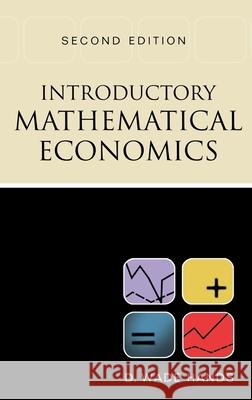Introductory Mathematical Economics » książka
Introductory Mathematical Economics
ISBN-13: 9780195133783 / Angielski / Twarda / 2003 / 400 str.
A strong relationship clearly exists between mathematics and modern economics; mathematics helps extend and formalize economic theory, and quantitative economic data influences the development and refinement of mathematical models. In Introductory Mathematical Economics, 2/e, author D. Wade Hands introduces students to a variety of new mathematical tools and explains how to apply those tools to a broad range of economic problems. The book begins with an overview of the necessary mathematical background, then presents a number of more advanced mathematical tools that allow students to expand their knowledge of economics. It offers a mix of classical and contemporary economic theory, covering the standard mathematical techniques such as optimization and comparative statics, as well as more specialized topics such as uncertainty, dynamics, nonlinear programming, and matrix theory.
Thoroughly revised and updated, this second edition offers students a wide range of mathematical techniques and the associated economic theory. The new Chapter 0, a mathematical review covering all prerequisite mathematics, serves as both a precourse mathematics refresher and a handy reference. All end-of-chapter problems are economics problems; many are detailed and require a substantial amount of economic interpretation in addition to the technical analysis. These problems have been revised and expanded in this second edition. Boxes in each chapter provide economic examples of relevant mathematical concepts. Several boxes discuss recent developments in economic theory, while others present results that influenced the evolution of modern economics. Featuring a clear and concise presentation of mathematical and economic concepts, Introductory Mathematical Economics, 2/e, is ideal for undergraduate courses in mathematical economics.











